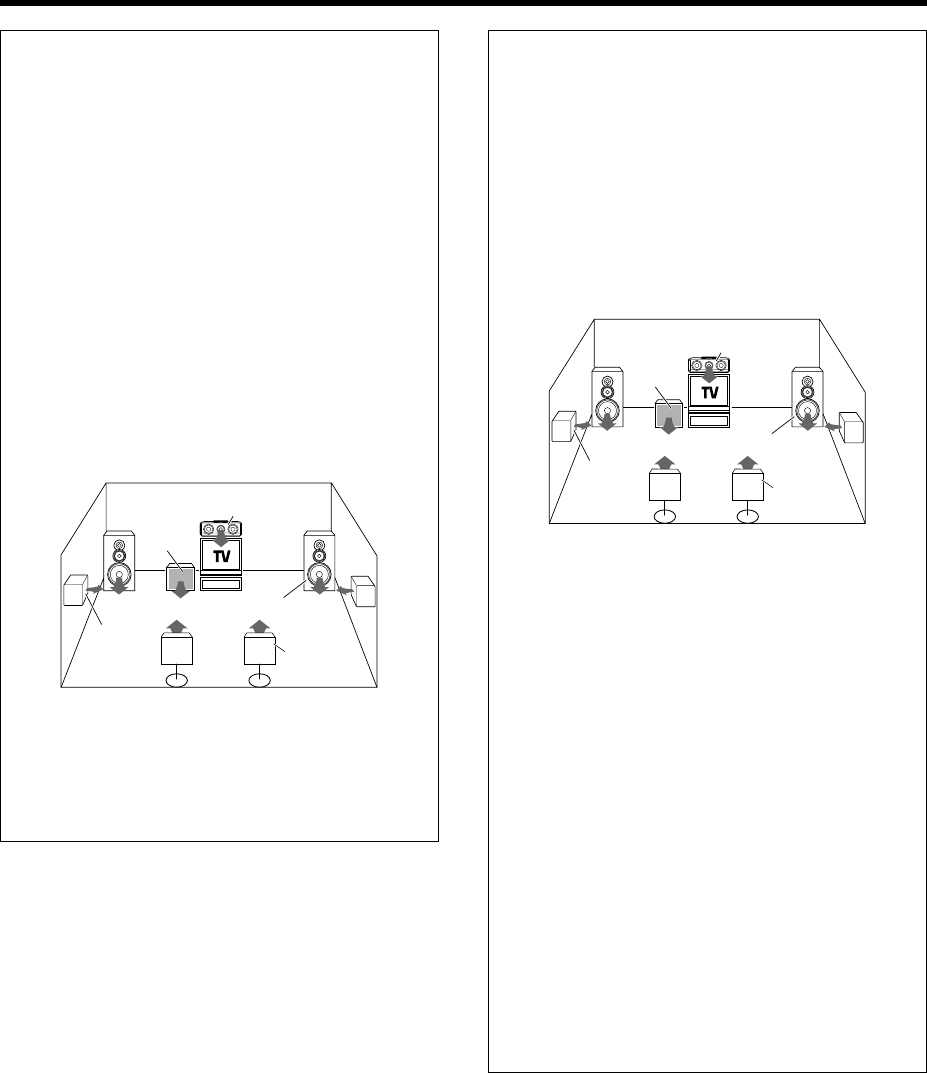
34
EN
Ambience effects
THX Surround EX mode
THX Surround EX is an extension of THX which was jointly developed
by Lucasfilm THX and Dolby Laboratories.
This new technology is able to place sound directly behind the listener
as it allows the sound mixers to encircle the listener with 360-degree
pans.
THX Surround EX is able to redirect bass energy in the surround back
channels to the subwoofer. It requires re-equalization of the surround
back channels to match the charecteristics of the front and left or right
surround channels.
It also consist of the basic THX features such as Re-equalization (Re-
EQ), Timbre Matching, Adaptive Decorrelation, Bass Peak Level
Manager and Loudspeaker Position Time Synchronisation.
Center speaker
Subwoofer
(SW)
Surround
speakers
(L, R)
Surround
back speakers
(L, R)
Front speakers (L, R)
Re-equalization (Re-EQ)
When listening in a typical home room, there may be some variation
of echo due to air absorption and smaller space. The sound produced
by flat response loudspeakers normally used in the cinema can be
overly bright in the home environment. Thus, Re-equalization (Re-EQ)
will adjust this condition to fit the home environment for a similar
cinema effect.
Timbre Matching
Due to human condition, listening to sound from various directions of
speakers can be very disturbing. So, it is important to smoothen the
flow of sound to suit the home cinema environment. Timbre Matching
is able to smoothen the flow of sound to the listener who will be able
to enjoy the cinema effect at home.
Adaptive Decorrelation
Mono sound track produced from the speaker system comes from
only one direction, which does not exemplify the cinema surround
sound experience. Adaptive Decorrelation is able to adjust the
inaccuracy of this sound distribution.
Bass Peak Level Manager
Certain sound tracks may produced various bass peaks that could be
unpleasant in a home cinema environment. Therefore, a user-adjust-
able Bass Peak Level Manager is used to control the bass level to suit
the system’s capacity. ∞
Loudspeaker Position Time Synchronisation
This function enables you to adjust the different speaker’s distance to
your listening position. It permits an accurate synchronisation, which
creates the ultimate sound environment.
DTS-ES
The DTS-ES (Digital Theater System-Extended Surround) represents
6.1-channel Discrete Surround format, expanding upon 5.1 surround.
DTS-ES format is a 6.1 channel sound system for movie theaters that
includes an additional surround center channel matrixed within
surround left and surround right. It’s compatible on predecessor DTS
5.1 system. The extra channel allows more accurate placement and
steering of sound accross the rear soundstage.The DTS-ES receiver
will be required, to experience a discrete 6.1-channel mix.
The DTS-ES decoders used in home cinema systems have decoding
options for utilizing the extra channel, in addition to processing
existing 5.1 channel surround sound :
DTS-ES Discrete 6.1 and DTS-ES Matrix 6.1 add the surround back
channel audio to the DTS 5.1-channel format to improve the acoustic
positioning and makes acoustic image movement more natural with
the 6.1-channel reproduction.
NEO:6 is a new technology which decodes 2-channel signals into 6-
channel signals using high-accuracy digital matrix technology. For the
best results, DTS-ES should be used with movie sound tracks recorded
with DTS-ES format which contain a digital flag that will automatically
activate this feature. However, for some titles, this feature has to be
activated manually.
According to the signals to be played back, DTS NEO:6 uses either the
NEO:CINEMA mode optimized for movie playback or the NEO:MUSIC
mode optimized for music playback.
* LFE = Low Frequency Effects. This channel delivers separate non-
directional bass signals to the subwoofer for more dynamic deep
bass sound effects.
DTS has a .1 or LFE channel.
The indication “LFE” appears in the display when a signal is being
input for this channel.
Center speaker
Subwoofer
(SW)*
Surround
speakers
(L, R)
Surround
back speakers
(L, R)
Front speakers (L, R)
*Optional in this mode.
•VR6070/33-41/EN 3/26/02, 2:42 PM34


















